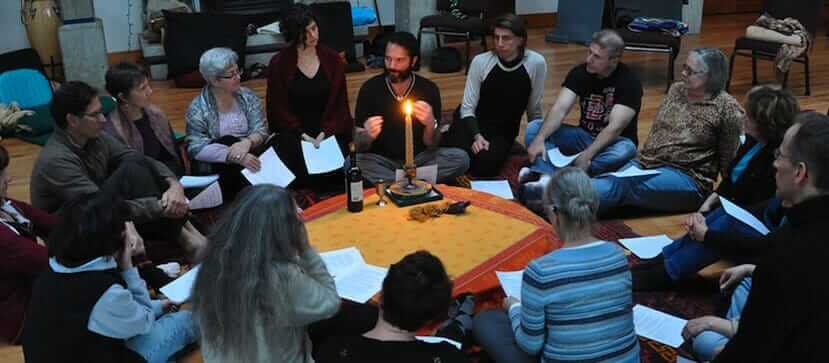Bet Alef Meditative Synagogue recently held their second annual meditation retreat at Chinook. We had the opportunity to speak today with Rabbi Olivier BenHaim about the retreat, his path and work, and the vision and purpose of Bet Alef’s inclusive spiritual community, which “foster[s] a Jewish spirituality for all ages that supports each individual, is realized in community, and manifests itself in our world as peaceful acts of greater compassion and love.” (www.betalef.org).
Rabbi Olivier spoke of the recent retreat as a journey on the meditative path through exploration of the Judaic Kabbalah, or “Tree of Life”. He described this ancient mystical symbol as “a map of consciousness,” and said that the 2.5 day retreat was a time for meditative practices which help one follow this map from lower to higher states of consciousness. Retreat participants included members of Bet Alef’s congregation as well as other members of the public from a diversity of spiritual backgrounds.
As an inclusive and open congregation, Bet Alef engages people from many spiritual and faith traditions. “The messages and teachings which the Bet Alef community and I share come from the roots of a 3,000 year-old tradition, but because it is grounded in the mystical, universal aspects of spirituality, [this work] is welcoming to people from any background,” BenHaim said. “[participants may be] of any faith. Some have no religious background, but a deep sense of spirituality.”
Rabbi Olivier’s own spiritual evolution was one of self-discovery. In his teenage years, he embraced a form of modern Orthodox Judaism, but he described having had a series of “spiritual crises” in his twenties which sent him into an exploration of the Buddhist path, including Zen and Tibetan Buddhism as well as Vipassana meditation. His awakening to the mystical path within Judaism was sparked by a meeting with Rabbi Ted Falcon, his predecessor at Bet Alef. “I thought, if I can come home—if I can follow the path of meditation within Judaism—then I want to be a part of it,” BenHaim said. What he learned about meditation practices through the lens of Judaism felt deeply aligned with his own spirituality, and he was called to become a Rabbi in order to continue Falcon’s work. After obtaining a B.A. and a Master’s Degree in Jewish Studies, BenHaim was ordained in 2009—the same year founding Rabbi Ted Falcon retired from Bet Alef leadership.
One key aspect of Bet Alef’s teachings is the manifestation of healing work through spirituality. According to BenHaim, “spirituality that is devoid of work—that is, spirituality that doesn’t translate in the world to work of healing, isn’t worth embracing.” In this way, he said, the Whidbey Institute is deeply aligned as a home for Bet Alef’s retreats. “It is no mistake that we would find ourselves at the Whidbey Institute, because to me the Institute is, in many ways, spirituality in action. Spirituality, at its essence, should manifest in healing of planet and healing of community—and that is what the Whidbey Institute offers.”
In addition to annual retreats at the Whidbey Institute and regular Shabbat and Holiday Services at Seattle First Baptist Church, Bet Alef Meditative Synagogue has an engaged Social Action team and a rich calendar of other offerings.

